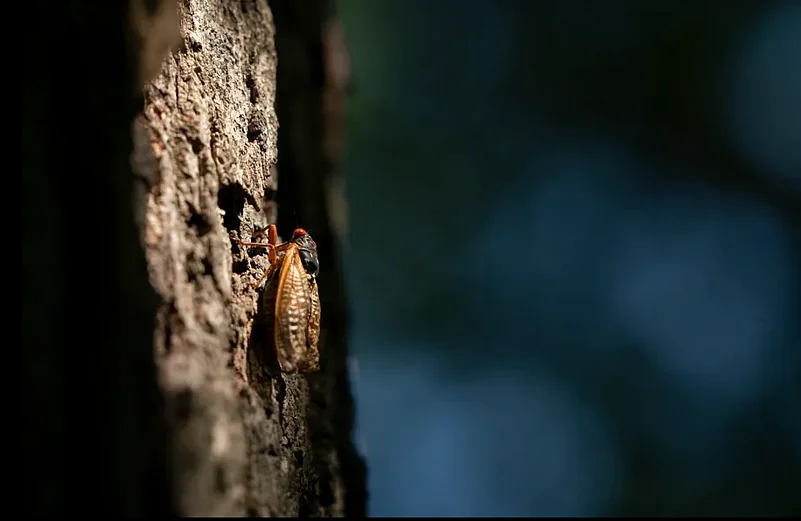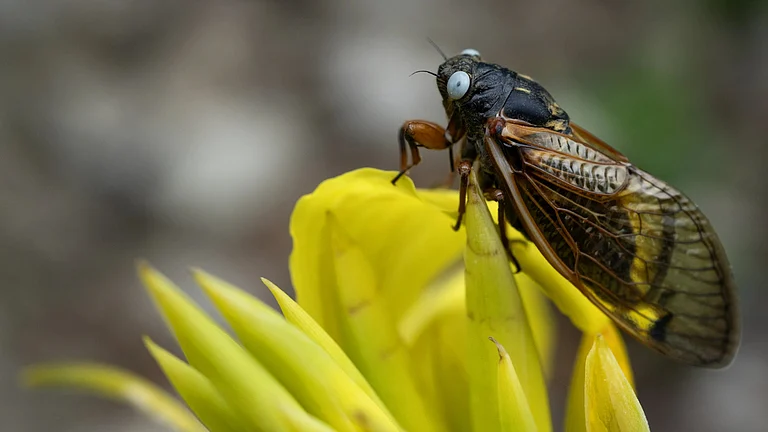If you've noticed an abundance of dead cicadas lately, you're not alone. However, this doesn't necessarily signify the end of the cicada emergence in Illinois. Instead, it could indicate a transition into the mating phase of these buzzing insects.
Experts had previously predicted that cicadas would continue emerging from the ground until late May and early June. However, once above ground, it takes several days before they commence their characteristic mating calls.
While massive numbers of cicadas have been observed in certain parts of the region, there has been a notable shift in some suburbs.
Dr Gene Kritsky, dean of Behavioral and Natural Sciences at Mount St. Joseph University in Cincinnati, who has been closely monitoring the emergence across the U.S. and particularly in Illinois, pointed out that although the numbers of cicadas emerging from the ground would decline around this time, it doesn't mean the end of the noise or sightings. Cicadas still need to complete their life cycles above ground.
"The adults will still be singing loudly until mid-June, and then dwindle down towards the end of June," said Kritsky.
He emphasised that while the emergence has slowed, "the singing is still getting louder," indicating that the mating phase is well underway.
When cicadas initially surface, they remain silent for a short period of time. According to Kritsky, it takes five days for a cicada to begin singing after emerging from the ground.
With only a few weeks to live post-emergence, cicadas are swift in their reproduction efforts. Male cicadas emit a loud sound to attract mates before their life cycle concludes.
Adult cicadas typically have a lifespan of only three to four weeks after emerging from the ground. Following mating, male cicadas complete their life cycle, while female cicadas create slits in tree branches to lay eggs.
"Some males may die shortly after reproduction, but most won't immediately perish upon mating and will live a short time longer," explained the National Museum of Natural History.
The eggs hatch six to seven weeks later, and the nymphs fall to the ground to start the cycle anew.
While the emergence spanned several weeks across Illinois and the Chicago area, the mating period will similarly extend.
John Cooley, a University of Connecticut entomology professor known as "Doctor Cicada," mentioned that sightings of cicadas in pairs signify that the emergence is about halfway through.
Residents need not fear dead cicadas, experts assure. Dead cicadas contribute to the environment by fertilising the soil. They can even be added to compost piles, exemplifying the natural cycle of life, according to the Nature Conservancy.
As cicadas begin to die off in larger numbers towards the end of the month, their bodies will decompose back into the soil, providing free fertiliser for trees.
While some areas reported massive cicada populations, others, particularly in the northwest suburbs and Chicago itself, saw few to none. These areas are unlikely to experience significant cicada activity now that the emergence phase is likely over.
The historic 2024 emergence involved two broods of cicadas, Brood XIII and Brood XIX, emerging simultaneously. This convergence, unseen for over 220 years, occurred mainly in Illinois, with a narrow part of Central Illinois possibly experiencing both broods.
For those who witnessed large cicada emergences, another opportunity awaits this summer when the eggs hatch in mid-July. While it's rare to witness this event, under the right conditions, observers in the Chicago area may catch a glimpse of nymphs falling to the ground, illuminated by the sun.




























